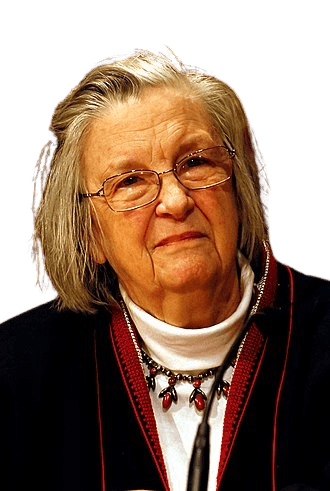Life and achievements
Early life
Elinor Ostrom, originally named Elinor Claire Awan, was born on August 7, 1933, in Los Angeles, California. Her father, Adrian Awan, was a set designer, and her mother, Leah Hopkins, was a musician. Ostrom’s parents separated when she was young, and she was primarily raised by her mother. During her childhood, she switched between attending the Protestant church with her mother and spending weekends in a Jewish household with her father.
Growing up during the Great Depression, Ostrom faced financial challenges but showed determination to succeed. She attended Beverly Hills High School, where, despite being advised not to pursue higher-level mathematics, she excelled academically. She was also a competitive swimmer, using her skills to fund her education by teaching swimming. Her high school debate experience sparked her interest in public policy and governance, subjects that would define her career.
Ostrom attended UCLA, where she earned a B.A. in political science in 1954. Despite financial independence challenges, she worked multiple jobs to support herself through school. After briefly working in the business sector, she returned to academia, earning both an M.A. and a Ph.D. in political science from UCLA, with her dissertation focusing on water resource management in Southern California. In 1963, she married Vincent Ostrom, with whom she would co-found the Workshop in Political Theory and Policy Analysis at Indiana University.
Legacy
Elinor Ostrom’s work revolutionized the understanding of collective action and resource management, particularly her challenge to the "tragedy of the commons" theory. She demonstrated that local communities could manage common-pool resources, such as fisheries, forests, and water systems, sustainably without state or private control. Her Institutional Analysis and Development (IAD) framework became essential in studying governance and environmental management.
Her book Governing the Commons (1990) summarized her findings and has since influenced policy development in sustainable resource management worldwide. Ostrom’s contributions, including her Nobel Prize in 2009, cemented her legacy as a pioneer in economic governance. Her work continues to shape policies and inspire scholars and policymakers around the world.
Milestone moments
Aug 7, 1933
Elinor Ostrom was born in Los Angeles, California
Elinor Claire Awan, later known as Elinor Ostrom, was born into a working-class family.
She spent most of her childhood with her mother after her parents divorced.
Her upbringing during the Great Depression gave her firsthand experience with social and economic challenges.
Apr 16, 1951
Beverly Hills High School leavers
Ostrom graduated from Beverly Hills High School, a turning point in her academic career.
Despite being discouraged from studying higher-level math, she was determined to pursue her academic interests.
Her participation in the debate team inspired her future focus on public policy and governance.
Mar 13, 1965
Earned Ph.D. in Political Science from UCLA
Ostrom received her Ph.D. in political science, focusing on water resource management in Southern California.
Her dissertation became the foundation for her later research on common-pool resource management.
This early work set the stage for her groundbreaking contributions to political economy.
Dec 17, 1973
Founded the Workshop in Political Theory and Policy Analysis at Indiana University
Elinor and Vincent Ostrom established this innovative center for the study of governance and collective action.
The workshop became a hub for interdisciplinary research and fostered discussions on governance and public policy.
It attracted scholars worldwide and established Ostrom as a leader in her field.
